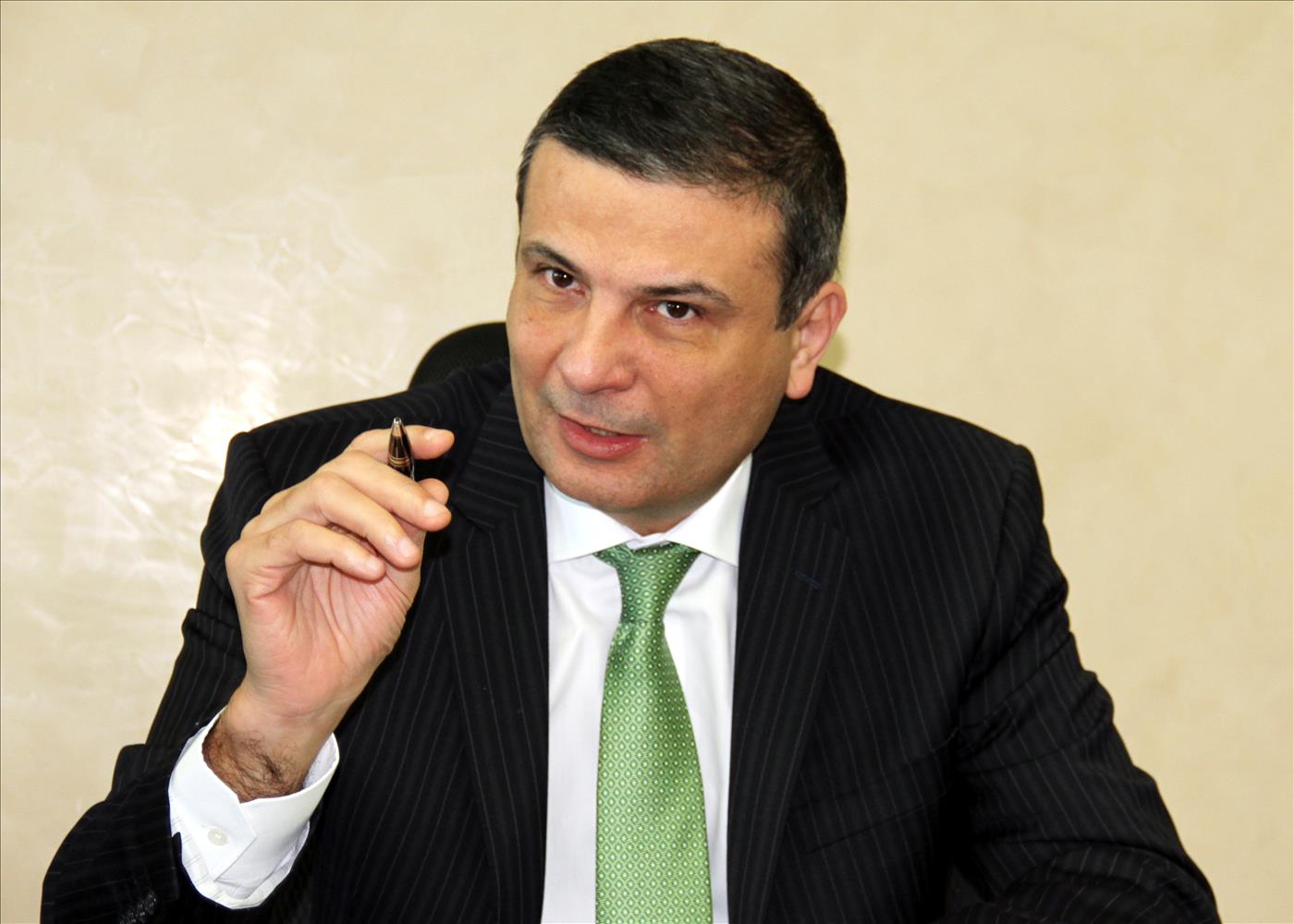(MENAFN- Daily News Egypt) Four years have passed since the Central Bank of Egypt (CBE) decision to liberalise the exchange rate on 3 November 2016. It was described as the boldest decision the CBE has ever made.
According to experts, the move succeeded in restoring the international investment community's confidence in the Egyptian economy, which was reflected in the volume of foreign cash flows to the country. It also improved the local economy's rankings at international institutions, and contributed to Egypt's superiority over all emerging economies.
Last week, a banking official revealed that a total of $400bn in foreign exchange (FX) inflows have come into Egyptian banks and the country's banking system since the November 2016 exchange rate liberalisation.

ABE Chairperson Alaa Farouk
Unprecedented level of FX reserves
Alaa Farouk, Chairperson of the Agricultural Bank of Egypt (ABE), said that the CBE has played a pivotal role in the success of the economic reform programme. This has taken place through its monetary policy, and its decision to liberalise the exchange rate. These have led to an increase in the monetary reserves of foreign currencies to unprecedented rates, in addition to an increase in foreign investments and market stability.
According to banking expert Mohamed Abdel-Aal, with the beginning of 2016, Egypt entered the most important challenge in its contemporary economic history. Despite the harsh conditions, the diversity of potential risks, and the multiplicity and severity of the sources of resistance, and the requirements, Egypt still chose to launch the economic and monetary reform programme.
The most important aspect of the programme was the decision to liberalise the Egyptian pound. Abdel-Aal said that this decision was one of the most important requirements for the success of the plan to launch the economic reform programme.
At the same time, there were many concerns and threats, as there was a parallel market, or a black market, that monopolises and controls the money market, with previous attempts to reduce this market unsuccessful.
Rather, the forces of interests and the mafia of currency dealers were stronger than all these attempts, which has caused a severe shortage of foreign exchange nationwide.
He added that, after the Egyptian pound's floatation, the market structure transformed into an organised, institutionalised market and transparent, through legitimate channels in all units of the Egyptian banking system. For the first time, the so-called black or informal market disappeared.

Banking expert Mohamed Abdel-Aal
Supply, demand mechanism controls exchange market
According to Abdel-Aal, the mechanism for determining the exchange rate has changed, and now depends on supply and demand, supported by the latest means of communication and financial technology (fintech).
He pointed out that after the decision to float the Egyptian pound, foreign exchange began to flow to the Egyptian market in normal and escalating quantities. This has been clear in the flow of over $400bn from international markets so far. with this influx of foreign exchange helping to meet all Egypt's import needs.
Cash reserves increased to historic levels, reaching, despite the novel coronavirus (COVID-19) pandemic, a current level of $39bn.
"The confidence of foreign and Egyptian dealers and investors in the Egyptian pound increased after the floatation, which helped stabilise it, and also helped in the success of plans to implement the economic reform programme,' Abdel-Aal said.
The exchange rate's stability also helped the monetary policy linked to interest rates in its restrictive and easing sides. This, in turn, helped the CBE control inflation and prices and encouraged businessmen and producers to increase the demand on banking credit.
Moreover, the stability of the exchange rate helped improve the Egyptian pound's performance, making it one of the most promising currencies in emerging countries. It has increased the demand on indirect investments by foreign investors in public debt securities.
It has also encouraged international evaluation institutions to fix Egypt's credit rating despite the pandemic. This has paved the way for Egypt to implement a new strategy for its loans by turning to lower-cost and longer-term loans, by resorting to international bond markets.
Abdel-Aal added that the stability of the exchange rate helped increase remittances from expatriate Egyptians to an all-time high of EGP 27.8bn. This has occurred alongside the existence of a real return difference between the Egyptian pound and the returns of other currencies.
"The economic reform programme, and its essence in the decision to liberalise the currency, were the passageway for the economic launch," Abdel-Aal said.

Tarek Metwally, a banking expert
Boldest, most important economic decision in decades
For his part, banking expert Tarek Metwally said that the decision to liberalise the exchange rate is the boldest and most important economic decision in decades.
Metwally also said that the exchange market in Egypt had previously suffered for long periods of time before the decision to float, which severely affected economic and social life.
He pointed out that the results of the decision were praised by everyone, both locally and internationally. This praise has primarily focused on the economic reform programme's success, with the testimony of the International Monetary Fund (IMF).
The programme's success has been further proven by Egypt's financial indicators which reflect growth rates of 5.6%, a decrease in the budget deficit, and an increase in monetary reserves from $17bn before the floatation to pre-pandemic levels of $45.2bn.
Additionally, there has been a decrease in the unemployment rate and the influx of remittances from Egyptians abroad at unprecedented rates, and high returns from the Suez Canal and foreign investment in government debt instruments.
Metwally said that these successes would not have been achieved in an unstable exchange market, and the economy would not have been able to withstand the repercussions of the coronavirus.
The Egyptian economy has, by-and-large, fared well due to the economic reforms that enabled the state to support and finance the many sectors that were affected by the global pandemic.
The Egyptian economy is still enjoying stability thanks to the liberalisation, which is an irreplaceable step for economic and financial reform.

Alia Mamdouh
Investors' confidence in Egyptian economy restored
For her part, Alia Mamdouh, Chief Economist at Beltone Investment Bank, stated that the CBE's November 2016 decision has succeeded in restoring the confidence of international investors in the Egyptian economy. The move has also transformed Egypt into the most attractive to foreign investment among emerging markets.
"This decision was very necessary at that time, and it was not in the interest of the Egyptian economy to delay it any longer after the deterioration of many economic conditions and indicators, whether in terms of monetary reserves or foreign investment,' Mamdouh said, 'There were also two foreign exchange rates in the country, with the transactions at that time taking place on the black market, which increased the risks to the economy."
She added that the Egyptian economy was not able to bear any more of the burdens resulting from the failure to liberalise the exchange rate at that time.
This was especially since the control of the parallel market over foreign exchange transactions increased to the point that it possessed most of the remittances of Egyptians abroad. It is noteworthy that remittances from Egyptian expatriates working abroad constitute one of the main sources of foreign exchange for the country.
Mamdouh indicated that the rapid movement of exchange rates in the parallel market at that time was impeding foreign investment. It also increased mistrust in investment and caused increasing difficulties for companies in setting their future budgets and feasibility studies.
The official exchange rates against the US dollar before the exchange rate liberalisation were between levels of EGP 8.80 for buying and EGP 9.80 for selling, while the price of the dollar in the parallel market reached EGP 15-EGP 19.
The economic conditions before the flotation all indicated the need to provide sources of income in foreign currency, Mamdouh added, which would not have been possible without restoring the confidence of foreign investors.
In addition, there has been a significant deterioration in the net foreign assets of banks across the banking sector, which was affecting the state's ability to fulfil its obligations and cover the import bill.
The net foreign assets of the Egyptian banking system amounted to about $14bn, while it rose again after liberalisation of the exchange rate for a net positive record of more than $19bn.
Mamdouh indicated that pre-2016, Egypt was a gas importer, before the discoveries of the various gas fields, which would not have been discovered without the exchange rate liberalisation.
During that period, there was not enough foreign currency liquidity to import even the raw materials needed in the production and manufacturing process. This caused the most damage to the industry and the availability of goods and products in the markets.
She noted that the FX reserves had reached its lowest level near the red line set by the IMF for developing countries. At the time, the Egyptian FX reserves could not meet the country's import needs of basic commodities for more than three months, compared to eight months now after the exchange rate liberalisation.
Egypt's foreign exchange reserves fell to their lowest levels, close to $13bn, before liberalising the exchange rate, before embarking on a historic ascent. Foreign exchange reserves now record $45.5bn, more than two years after the liberalisation of the exchange rate.
Mamdouh said that the industrial sector began to recover after the liberalisation of the exchange rate, which was most salient during 2020. This appeared following CBE initiatives to support the economy and industry, which are also one of the results of liberalising the exchange rate.
Foreign capital flow restored
Mamdouh said that foreign capital inflows have returned to the Egyptian market after a halt of many months, especially in debt instruments that represent an important channel for foreign exchange flows to the country.
Egypt has become more competitive and attractive to international funds, compared to other similar countries in emerging markets.
The balance of foreigners in Treasury bills (T-bills) had fallen to a level not exceeding $110m, before it recovered following the exchange rate liberalisation to a current position of $21bn.
Mamdouh indicated that the remittances of Egyptians working abroad have returned to legitimate channels through banks after they were attracted by the black market. In fiscal year (FY) 2019/20, remittances reached their highest historic levels, recording about $28bn after falling to $18bn just before the exchange rate was liberalised.
She pointed to the significant improvement in macroeconomic indicators and Egypt's credit ratings, whether sovereign or sectoral. This has contributed to restoring the confidence of international investors in the Egyptian economy, and strengthened Egypt's ability to overcome the crises that followed the exchange rate liberalisation process, including the emerging market crisis, the 2018 US-Chinese trade war, and the global health crisis of 2020.
Mamdouh also indicated that the exchange rate's liberalisation and the subsequent positive economic consequences enabled the Egyptian state to rebuild various economic sectors. These have been of importance in major national projects that changed the face of Egypt, and contributed to huge capital flows into the economy to cover the current account deficit.
She emphasised that, thanks to the decision to liberalise the exchange rate, Egypt has become one of the few countries to have succeeded in implementing an economic reform programme, with the testimony of all international institutions. It maintained currency stability, controlled the inflationary effects that resulted from liberalising the exchange rate, and restored investor confidence.
Mamdouh also pointed out that the international market is waiting for Egypt to undertake any bond issuances, which is noticeably evident in the large coverage of any offering process.
She said that International investors are increasing their investments in the Egyptian market, despite their withdrawal from other emerging markets. Egypt, however, has not been affected by the reform decisions and the liberalisation of the exchange rate.
MENAFN07112020000153011029ID1101088924